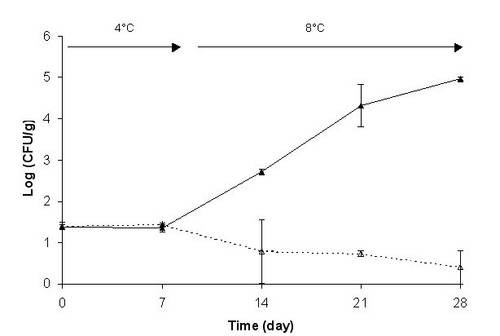February 28. 2005Listeria monocytogenes is the pathogenic bacterium responsible for listeriosis, which is a food-borne disease. Listeriosis is generally associated with a high mortality rate (20-40%). Populations at greatest risk are pregnant women, newborn infants, the elderly and people with a weak immune system.
Lightly preserved fish products (LPFPs) are classified as high risk merchandises. Indeed, the raw fish can be contaminated by L. monocytogenes, cross-contamination during processing can occur and the processing parameters are insufficient to inactivate the bacterium or to totally prevent growth during chilled storage. Since LPFPs have an extended shelf-life and are consumed without further cooking, they represent a health risk for consumers.
Last years, many efforts have been done in clean-up and sanitation procedures, reducing significantly the prevalence of L. monocytogenes in those products. However, solutions are still to be found to prevent growth in order not to overpass 100 CFU g-1 which is the maximum tolerated limit till the sell-by date in many European countries. This is one of the aims of project 4.2 HURDLETECH within the SEAFOODplus.
IFREMER and ENITIAA are developing the biopreservation concept, which consists in inoculating food product by selected bacteria to inhibit the growth of undesired micro-organisms. Recently they have isolated from fish products three interesting strains, belonging to the lactic acid bacteria (LAB) group which are recognised as safe micro-organisms. Those strains are able to inhibit growth of a wide collection of L. monocytogenes, due to production of a small antilisterial peptide called bacteriocin. All the Listeria strains were inhibited but different groups could be distinguished differing in sensitivity. However, one of the LAB strains showed always the highest inhibitory effect. The anti-listerial capacity was then tested in cold-smoked salmon (an example of LPFP) and once again, one of the strains was very efficient, maintaining the level of L. monocytogenes inferior to 50 CFU g-1 (initial level of inoculation : 20 L. monocytogenes g-1) during the four weeks of vacuum storage at 4° and 8°C, whatever the sensitivity of the set of L. monocytogenes tested.
Further work is necessary to evaluate the non spoilage activity of the LAB strain selected, but biopreservation yet seems to be a promising strategy to master L. monocytogenes risk in LPFPs.

Growth of Listeria monocytogenes alone (straight line) or in co-culture with one strain of bioprotective lactic acid bacteria (dotted line) in cold-smoked salmon stored for 9 days at 4°C and 19 days at 8°C.